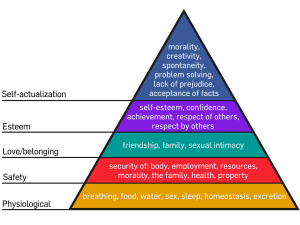Breaking Bad. View it on Netflix, if you’ve got the stomach for it that is. Warning. The violence can be graphic, and the content is disturbing. Yet, I can’t remember another television series I found as compelling. As in, I couldn’t stop watching it.
I was late to the series. I had heard the buzz, (it won a total of 16 Emmy awards). But didn’t have Netflix at the time.
It tells the story of Walter White, played brilliantly by Bryan Cranston, and his family. Walt is a high school chemistry teacher and bored out of his mind. He is clearly underemployed as he was part of Nobel winning team of chemists at one point in his career, and then got cut out of a multi-billion dollar start up. But he is a good man, doing what a conventional man is taught he must do for his family and reputation. And, bored out his mind. In the first episode he is diagnosed with terminal lung cancer. That’s when Walt’s transformation kicks in.
As a good man, Walt thinks about his family’s wellbeing when he is gone. They won’t be able to live on a teacher’s survival benefits. His wife is pregnant. They have a son who is ready to go to college, and a daughter on the way. They can’t even afford proper health care for Walt. What’s a man to do? This theme of the meaning of masculinity runs throughout the series, the core of which for Walt is being able to provide for his family.
Up to this point in his life Walt’s life has not been his own. In one memorable scene, when everybody is making plans for Walt’s chemotherapy treatment, he explodes. It’s the first time we see something other than Walt’s pleaser personality. He makes his case by raging that all of his life he’s done what everybody else wanted him to do. No more. This decision about chemotherapy is his alone. It’s a chance to be individuated from everybody else’s expectations. It’s the first sign that lurking under Walt’s calm, well-adjusted exterior, there is a mountain of repressed energy needing to find an outlet.
Walt’s surprising solution is to “cook” methamphetamines, In the vernacular, crystal meth, a highly addictive street drug. But the pay is good, very good.
In a way, the rest of the five seasons of episodes are about the evolution of Walt’s shadow. His confrontation with mortality, his unmet need for mastery, his need to be recognized and respected, and the ever-present rationalization, that all that he does, all that he risks, he’s doing it “for the family” drive Walt to become, ahem, very unconventional.
He takes on the pseudonym of Heisenberg, a nice touch. Heisenberg was the physicist responsible for exploding the Newtonian worldview, in which causality ruled. If we could just figure out the rules of the game, discover the cause of an event, then everything else would be predictable and controllable. But the Uncertainty Principle overturned the apple cart. The illusion of the objective scientific observer was exploded as Heisenberg showed that if a particle was both small enough and fast moving, you cannot determine both its velocity and position; for you can’t observe it without changing its behaviour. Essentially, he showed that there is a limit beyond which predictability is possible. Walt’s choice to become Heisenberg is as cataclysmic a personality change as Heisenberg’s physics was to Newtonian physics. And as unpredictable. His actions set off a series of events that even his considerable intelligence could not control or predict.
In the process of becoming a legendary cook of a product call blue meth, (remember the classic 1969 song by Tommy James and the Shondells – Crystal Blue Persuasion?), all the latent energies of the frustrated masculine archetype begin to fashion a very talented, very clever, very cold-hearted criminal.
The lay philosopher, and social critic, Colin Wilson, spent a lot of time and ink studying criminal behaviour. I wonder what he would have made of our protagonist? As Wilson studied the history of criminality along with the criminal personality, he began to wonder if these people were tracking through Maslow’s hierarchy of needs, just like non-criminals, only taking a moral shortcut.

Walt felt the same evolutionary life force surging through him to achieve self-actualization. The life force is not itself moral. It just wants to be expressed. We are free in regard to how we channel this life force. So we see Walt at first claiming that his motivation is for basic (shelter and security), the bottom rung of Maslow’s chart. He needs to provide for his family after he’s gone. And he must find a quick way to do so. Moving up the chart, once Walt starts making serious coin, he realizes that he’s good at it. He feels good about himself (esteem) finally. He derives a sense of (belonging) as well as his reputation as Heisenberg spreads throughout North America, Mexico, and Europe.. Having failed to be recognized by an early business venture that went on to make billions, this is Walt’s chance to prove himself as a master of something (mastery and creativity) Ultimately, Walt comes clean with himself and his wife. He wasn’t doing this for his family, but rather because he liked it, he was good at it, and most importantly he felt alive! Old Walt uses all his genius, problem-solving, spontaneity, and creativity (self-actualization) in the process. This is Wilson’s take on criminality and it makes sense to me.
But I also think that Walt’s repressed self has to be the result of emotional trauma. He had sat on some simmering rage, resentment, and life force way too long. And his brush with death gave him the courage to unleash all his dormant creativity, talent, and problem-solving, Is there such an animal as a self-actualized criminal? The series is clever in that you have this sense that something is going on here that far transcends the “good-guy/bad guy” duality. You can see yourself in Walt, a character with whom I never lost empathy absolutely. Yes, the cringe factor was very high. But in the end, I found myself extending grudging admiration for a man who accomplished everyone of the goals that he set for himself.
If there’s a lesson to be learned, for me, it would be that it is critical to construct a life that in which we feel truly alive. There is an evolutionary life force living us that won’t settle for neutrality or deadness. If it is not expressed in a healthy, creative, moral way, it will turns to violence, either toward self or others. And the path back to vitality for most of us is through the trauma that caused us to necessarily repress our life force.


Very well said